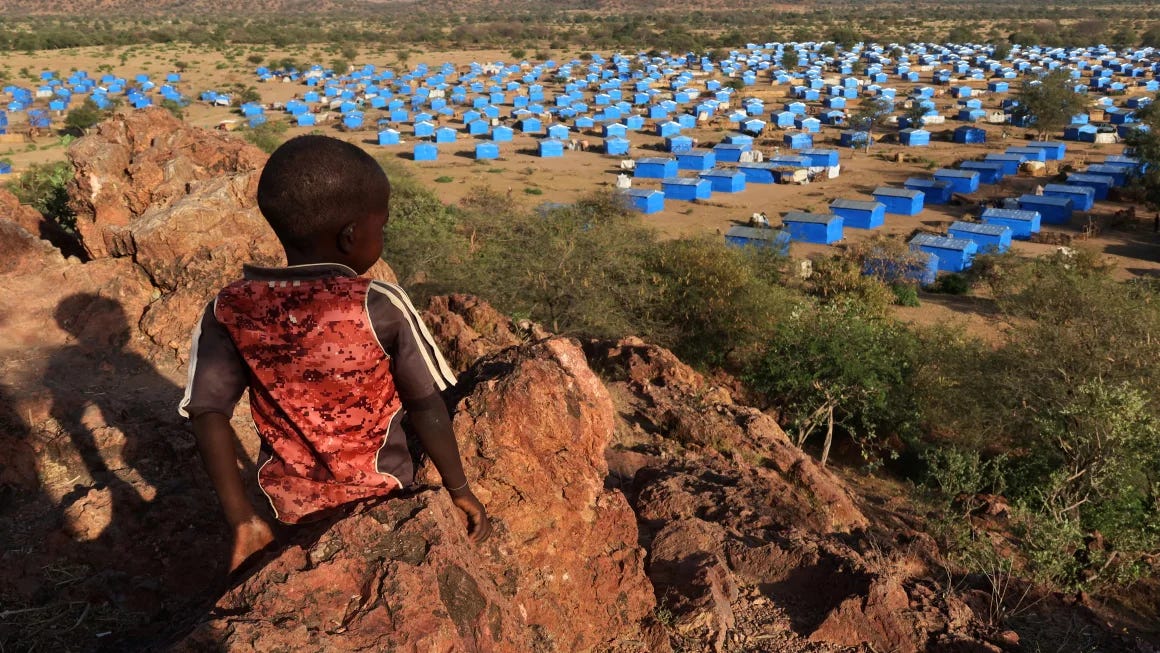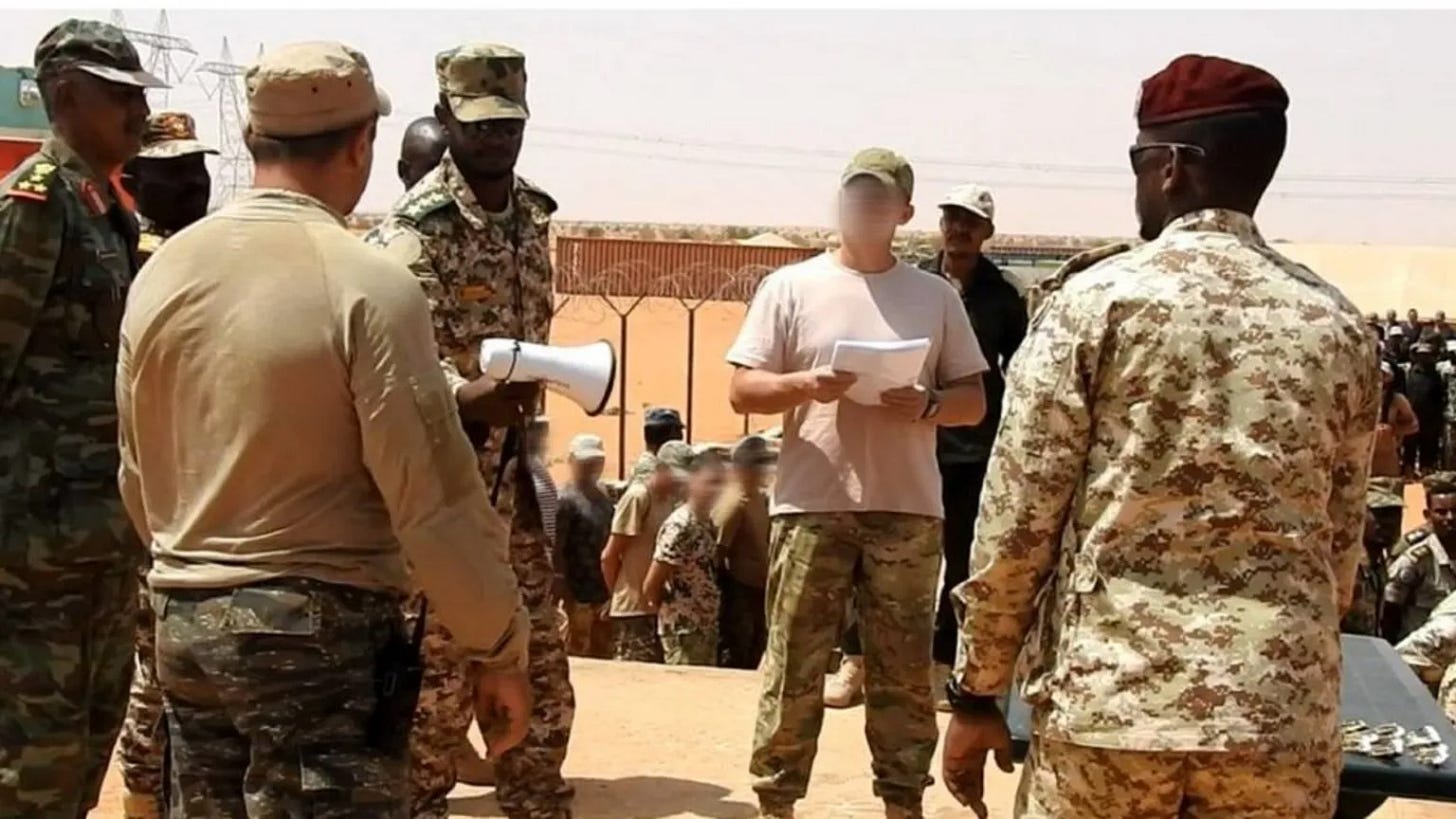Sudan: A Breeding Ground for Global Moneyed Interests
Powerful interests are fanning the flames of a Sudanese civil war that will likely plunge the country into famine in a few weeks. Many are profiting greatly.
Gold smuggling helps fund the RSF’s genocidal campaign. Image source
Sudan, now over one year into a devastating civil war, sits at the edge of an even greater catastrophe. At al Lait refugee camp north of Darfur, residents have resorted to eating dirt as thousands flee to the area to escape fighting amid a new regional ethnic cleansing campaign by the Rapid Support Forces (RSF). The Sudanese Armed Forces (SAF), the RSF's chief rival, also stands accused of widespread abuse against Sudan's civilian population. These abuses by both sides have caused an estimated 4.4 million Sudanese to flee their homes, causing domestic food production to plummet and over 20 million people not to know where their next meal will come from. Sudan will likely slip into an official famine by next month, killing an estimated half a million people, according to the Dutch think tank, Clingendael Institute.
Although far removed from international headlines, the warring factions of Sudan's bloody civil war do not fight alone. Instead, Sudan is host to many competing military and financial interests, each with a stake in the outcome of this war and ensuring its prolongation.
A boy overlooks a refugee camp near the Chadian border in November, 2023. Sudan will likely soon be home to the world’s largest hunger crisis. Image source
The RSF and its backers
Sudan's RSF paramilitary group formed in 2013 from the Arab Janjaweed militias who notoriously carried out the genocide in Darfur that started in 2003 and continues under the RSF banner to this day. Led by General Mohamad Hamdan Dagalo (aka Hemeti), the group's seasoned fighters launched a full-scale civil war against the SAF in April 2023 following the breakdown of the power-sharing arrangement between the two. From its base of operations in the western region of Darfur, the RSF maintains an estimated fighting force of 100,000 troops.
Gold mining in northern Darfur finances the bulk of the RSF's war chest. In 2018, then-President Omar Bashir gave Hemeti free rein to sell Darfuri gold through his family firm, Al Gunade. This trade has made him one of, if not the, wealthiest men in the country, with an estimated net worth of $7 billion today. To sell this gold and finance the RSF's war effort, Hemeti relies on international partners, especially as sanctions against him and his forces continue to mount amid talk of more to come.
The United Arab Emirates (UAE) is one of these partners. The UAE's increased prominence in Sudan started in 2019 when it and Saudi Arabia jointly supported the post-coup transitional government headed by the military and RSF, with the two powers offering $3 billion in aid during this time. However, the two powers now back opposing sides of Sudan's ongoing civil war, with the UAE playing a crucial role in exporting gold on behalf of Hemeti and the RSF. Hemeti's family office is reportedly headquartered in the UAE's financial hub and largest city of Dubai. The general also spent several weeks in the UAE capital of Abu Dhabi immediately before the war's outbreak last year, meeting with President Sheikh Mohamad bin Zayed and Vice President Sheikh Mansour.
The UN reports that Hemeti has established at least 50 companies outside Sudan to export gold to the UAE, where it enters the global market. Hemeti also stores his wealth in UAE banks and uses the UAE as the operational base for the RSF's social media propaganda campaigns. According to UN experts: "Complex financial networks established by the RSF before and during the war enabled it to acquire weapons, pay salaries, fund media campaigns, lobby, and buy the support of political and armed groups."
Russia also plays a vital role in supporting the RSF's war effort. Although Russia's private military company (PMC) Wagner initially supported the government of Omar Bashir and the Sudanese military upon his overthrow, the group later aligned with Hemeti and the RSF. Wagner and its Russian mining affiliate, Meroe Gold, operate mining sites in Sudan that foreign contractors abandoned following the war's outset. From Sudan, Wagner exports gold through multiple routes, including air routes via Dubai and the Russian airbase in Latakia, Syria, and by land through the neighboring Central African Republic (CAR), where Wagner also maintains a substantial presence. Much of this gold eventually makes its way to Russia, where Moscow has built a significant reserve of the precious metal to help weather U.S. sanctions amid the ongoing war in Ukraine. One anonymous source estimated that Russia receives around 30 tonnes of Sudanese gold annually.
In addition to providing security at mining sites, Wagner reportedly trains and supplies weapons to the RSF, including surface-to-air missiles (SAMs), which play an essential role, given the armed forces' air superiority. According to the Wall Street Journal, Wagner offered to supply the RSF with shoulder-mounted Manpads, a highly effective and portable SAM system, from its supplies in neighboring CAR.
Although the UAE denies selling arms to the RSF, the Financial Times reported that there was "credible" evidence that Abu Dhabi was doing so based on a leaked UN report. According to the report, the UAE has sent weapons to the RSF at intervals of twice per week via a UAE airbase in the northern Chadian city of Amdjarass, which is near the RSF's base of operations in Darfur. From its Amdjarass base, the UAE reportedly exports "powerful weapons and drones" to the RSF while treating RSF fighters at a field hospital it established there.
Wagner forces operating in Sudan. Image source
The SAF and its backers
The SAF comprises the de facto government of Sudan and is led by General Fattah al-Burhan, who previously led Sudanese troops in the Saudi-led war in Yemen. Saudi Arabia remains a steadfast backer of al-Burhan and the SAF, primarily due to its desire to maintain security on the Red Sea, which is integral to recent regional investments, such as the NEOM line city project. For Riyadh, Sudan is also an opportunity to quash UAE ambitions amid simmering tensions between the two major Gulf powers. Although Saudi Arabia and the United States attempted to broker a ceasefire in Sudan last year, these ultimately failed, drawing the kingdom closer to the SAF.
As the official armed forces of Sudan, the SAF has long had access to a vast array of weapons and military vehicles supplied by countries such as Russia, China, Iran, Ukraine, and Belarus. More recently, Saudi Arabia has facilitated Iranian weapons shipments to Sudan by allowing Tehran to use its airspace. In February, the SAF announced it had acquired Iranian Mohajer-6 attack drones. Iranian drones have reportedly played a significant role in helping halt RSF advances. For Tehran, Sudan is just another market to add to its growing list as a leading global arms exporter.
Egypt maintains close ties to the SAF and has a substantial interest in the war's outcome for security purposes. This concern comes amid an influx of over 317,000 Sudanese migrants to Egypt, in addition to the 4 million living there before the war, adding significant strain to the country's already struggling economy and ailing public services. Moreover, Cairo sees al-Burhan as a critical ally in its growing dispute with Ethiopia over the latter's dam project that threatens to limit flows of the Nile, on which Egypt depends for 90% of its water supply. For these reasons, Egypt plays a significant role in assisting the SAF, including training air force troops and sending medical aid by airlift. Egypt also sent two Turkish Bayraktar TBT attack drones last October and has reportedly considered a full-scale invasion in support of the SAF.
Ukrainian special forces also operate in Sudan on behalf of the SAF as a counter to Russia's presence there. In recent months, videos have emerged showing Ukrainian special forces using kamikaze drones against enemy positions in Khartoum and snipers and commandos conducting raids. Ukrainian troops have reportedly killed and captured multiple Sudanese and Russian operatives wearing Wagner uniforms
Iranian drones such as the Mohajer-6 (pictured) are increasingly prominent in Sudan. Image source
A cynical game with a dizzying array of interests
The number of conflicting international interests present in Sudan is dizzying. Here are some of the contradictions as I see them:
UAE and Saudis are funding opposite sides while working together against the Houthis in Yemen and attempting to present a united front globally on several issues.
Saudi Arabia is facilitating Iran's role in the conflict despite Tehran's support for the Houthis, while the UAE is working with Russia despite the Gulf State's pro-Western leanings.
Russia is taking the side of the UAE-backed RSF while attempting to improve relations with Saudi Arabia.
Egypt aims to promote stability in Sudan to serve its security interests. Still, it is increasingly partisan in favor of a side that shows no signs of breaking the deadlock that increasingly defines this brutal civil war.
Ukraine is siding with the SAF, which buys weapons from Iran. Iran sells Russia vast amounts of weapons that bomb cities, damage critical infrastructure, and kill civilians in Ukraine.
There are no 'good guys' in this fight. The RSF is responsible for a genocide that the SAF helped them commit until very recently. By choosing one side over the other, the various parties funding this war are, in one way or another, responsible for its prolongation. The regional and international consequences of this situation are potentially staggering. For example, the growing rift between Saudi Arabia and the UAE could result in increased Arab disunity when the regional influence of Iran and Turkey is on the rise and when Palestinians are in their greatest need of a unified diplomatic front. However, the cynic in me thinks it may just be about money – money from gold trafficking for those backing the RSF and arms trafficking for those backing the SAF. In this way, Sudan is just one area where these moneyed interests collide, and their interests could realign elsewhere should another opportunity arise.
Whether Sudan is a true battleground of international interests or merely a lucrative opportunity for gold smugglers and arms traffickers, it is the civilians there who will continue to suffer most. With June just weeks away and famine likely to ensue, the world is again about to witness the consequences of games played by moneyed interests far removed from the conflicts they profit from.






